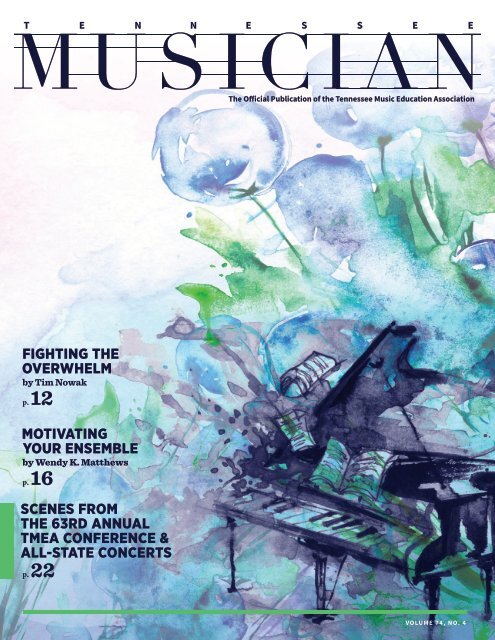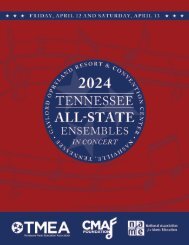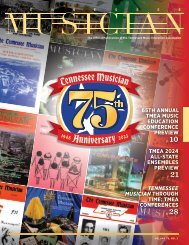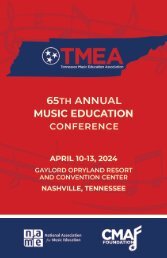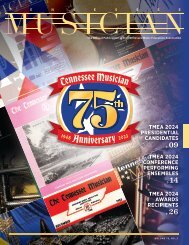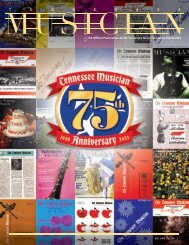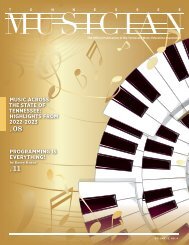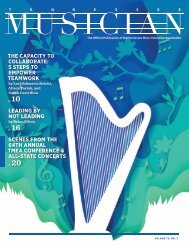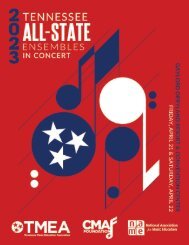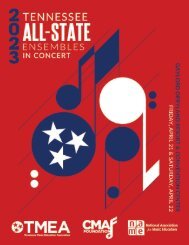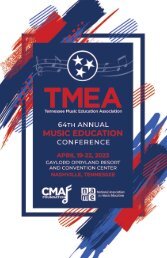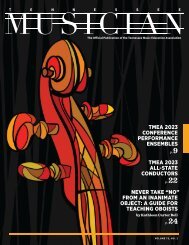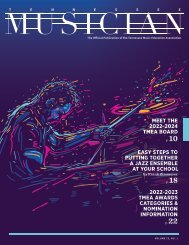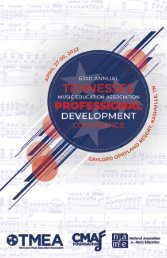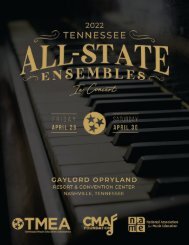TN Musician Vol. 74 No. 4
Create successful ePaper yourself
Turn your PDF publications into a flip-book with our unique Google optimized e-Paper software.
The Official Publication of the Tennessee Music Education Association<br />
FIGHTING THE<br />
OVERWHELM<br />
by Tim <strong>No</strong>wak<br />
p. 12<br />
MOTIVATING<br />
YOUR ENSEMBLE<br />
by Wendy K. Matthews<br />
p. 16<br />
SCENES FROM<br />
THE 63RD ANNUAL<br />
TMEA CONFERENCE &<br />
ALL-STATE CONCERTS<br />
p. 22<br />
VOLUME <strong>74</strong>, NO. 4
School of<br />
Music<br />
B.M. in Music Performance<br />
Instrumental<br />
Vocal<br />
Jazz<br />
Composition<br />
B.M. in Music Education<br />
Instrumental<br />
Vocal<br />
tntech.edu/music<br />
(931) 372-3161<br />
music@tntech.edu<br />
CFA149-PRNT-22<br />
1150 N. Dixie Ave.<br />
Campus Box 5045<br />
Cookeville <strong>TN</strong> 38505-0001
TIMING IS EVERYTHING<br />
drums on demand<br />
coming soon to a field near you<br />
MAPEX MARCHING DRUMS ON DEMAND DELIVERS DURABLE PREMIUM WRAP FINISHES WITHOUT ENDLESS LEAD TIMES<br />
MADE TO ORDER IN OUR NASHVILLE, <strong>TN</strong> DRUM SHOP<br />
AVAILABLE NOW! EXPLORE THE OPTIONS TODAY AT QUANTUMMARCHING.COM
TABLE OF CONTENTS 2022 VOLUME <strong>74</strong>, <strong>No</strong>. 4<br />
04<br />
05<br />
PROGRAM NOTES<br />
TMEA Board and Council Directory<br />
2021-2022<br />
Tennessee <strong>Musician</strong> Advertiser Index<br />
Issue <strong>No</strong>. 4<br />
07<br />
09<br />
Prelude - A Message from the Editor<br />
Anna Laura Williams<br />
TMEA President’s Message<br />
Alexis Yatuzis-Derryberry<br />
GUEST FEATURES<br />
12<br />
16<br />
31<br />
Fighting the Overwhelm:<br />
Organizing the Demands of Teaching<br />
Life Through Action Research<br />
by Tim <strong>No</strong>wak<br />
Motivating Your Ensemble:<br />
Ignite a Spark!<br />
by Wendy K. Matthews<br />
TEACHING IN TENNESSEE<br />
TMEA Back Then<br />
May 1980<br />
22<br />
Tennessee <strong>Musician</strong> is mailed to members four times each year at an annual<br />
subscription rate of $6.00 (included in dues).<br />
<strong>No</strong>n-member subscription rate (includes S&H): $30.00 per school year;<br />
single copies: $10.00 per issue.<br />
63RD ANNUAL TMEA CONFERENCE<br />
Scenes from the 63rd Annual TMEA<br />
Professional Development Conference:<br />
April 27-30, 2022<br />
photography by David Royse<br />
Postmaster - Send address changes to:<br />
Tennessee <strong>Musician</strong><br />
c/o Tennessee Music Education Association<br />
2441-Q Old Fort Pkwy, #635<br />
Murfreesboro, <strong>TN</strong> 37128-4162<br />
Published by Slate Group: 6024 45th Street, Lubbock, Texas 79407.<br />
Graphic Design: Nikki Davis. Account Executive: Ian Spector (800-794-5594).<br />
<strong>No</strong>n-Profit 501(c)(3) Organization. U.S. Postage Paid at Lubbock, Texas.<br />
ISSN Number 0400-3332; EIN number 20-3325550.<br />
Copyright © 2022 Tennessee Music Education Association. Reproduction in any form<br />
is illegal without the express permission of the editor: Anna Laura Williams, Managing<br />
Editor & Advertising Manager; anna.laura.williams@tnmea.org.<br />
Tennessee Music Education Association | www.tnmea.org | 3
TMEA BOARD AND COUNCIL<br />
national executive board - national association for music education<br />
Southern Division Immediate Past-President<br />
Dian Eddleman<br />
deddleman@usjbruins.org<br />
tmea executive board<br />
TMEA Executive Director<br />
Michael W. Chester<br />
michael.chester@tnmea.org<br />
TMEA President<br />
Alexis Yatuzis-Derryberry<br />
alexis.yatuzisderryberry@tnmea.org<br />
TMEA President-Elect<br />
Ryan Fisher, Ph.D.<br />
rfisher3@memphis.edu<br />
TMEA Immediate Past-President<br />
Lafe Cook<br />
lcook@k12k.com<br />
TMEA Secretary<br />
Dian Eddleman<br />
deddleman@usjbruins.org<br />
board of directors<br />
TMEA State General Music Chair<br />
Franklin Willis<br />
franklin.willis@mnps.org<br />
TMEA State Choral Chair<br />
Jason Whitson<br />
whitsonj@btcs.org<br />
TMEA State Orchestra Chair<br />
Anna Maria Miller<br />
amamiller@bellsouth.net<br />
TMEA State Band Chair<br />
Jacob Campos<br />
jacob.campos@wcs.edu<br />
TMEA State Higher Education Chair<br />
Robert Bryant, Ph.D.<br />
rbryan14@tnstate.edu<br />
TMEA NAfME Collegiate Chair<br />
Jody Blake, Ph.D.<br />
jblake17@utm.edu<br />
TMEA Society for Music Teacher<br />
Education/Research Chair<br />
Loneka Wilkinson Battiste, Ph.D.<br />
lbattis2@utk.edu<br />
TMEA Advocacy and<br />
Government Relations Chair<br />
Christopher Dye, Ed.D.<br />
christopher.dye@mtsu.edu<br />
TMEA Publications Editor and<br />
Advertising Manager<br />
Anna Laura Williams<br />
anna.laura.williams@tnmea.org<br />
tmea council<br />
WTGMEA President<br />
Jennifer Proseus<br />
wtgmeamemphis@yahoo.com<br />
WTGMEA President-Elect<br />
Harrison Howle<br />
howle.harrison@hardingacademymemphis.org<br />
WTVMEA President<br />
Sharon Morris<br />
smorris@lced.net<br />
WTVMEA President-Elect<br />
Adrian Maclin<br />
maclinal@scsk12.org<br />
WTSBOA President<br />
Jennifer Cupples<br />
jennifer.cupples@wcsk12tn.net<br />
WTSBOA President-Elect<br />
Benjamin Martin<br />
bmartin@huntingdonschools.net<br />
project chairs<br />
TMEA Guitar Education<br />
(Modern Band) Chair<br />
Ryan Payne<br />
payner@rcschools.net<br />
TMEA Jazz Education Policy Chair<br />
Ollie Liddell, Ph.D.<br />
ollie_liddell@hotmail.com<br />
TMEA Music in Our Schools Month Chair<br />
Tiffany Barton<br />
tntreblechoir@gmail.com<br />
TMEA Music Merchants Industry Chair<br />
Nick Averwater<br />
nick@amromusic.com<br />
TMEA Retired Teachers Chair<br />
Bobby Jean Frost<br />
bjfrost@aol.com<br />
TMEA Tri-M Co-Chair<br />
Dian Eddleman<br />
deddleman@usjbruins.org<br />
4 | TENNESSEE MUSICIAN | 2022 | <strong>Vol</strong>ume <strong>74</strong>, <strong>No</strong>. 4<br />
MTGMEA President<br />
Corynn York<br />
yorkc@rcschools.net<br />
MTGMEA President-Elect<br />
Abbi Miller<br />
abigail.miller@cityschools.net<br />
MTVA President<br />
Gerald Patton, Ed.D.<br />
pattong@rcschools.net<br />
MTVA President-Elect<br />
Lorna Pyka<br />
lornapyka@yahoo.com<br />
MTSBOA President<br />
J.R. Baker<br />
john.baker@rcstn.net<br />
MTSBOA President-Elect<br />
Stacy Jernigan<br />
stacy.jernigan000@gmail.com<br />
TMEA Tri-M Co-Chair<br />
Anna Laura Williams<br />
anna.laura.williams@tnmea.org<br />
TMEA Webmaster<br />
John Womack<br />
webmaster@tnmea.org<br />
all-state management team<br />
<strong>TN</strong> All-State Choral Chair<br />
Brian Russell, DMA<br />
brian.russell@tnmea.org<br />
<strong>TN</strong> All-State Instrumental Chair<br />
Carter <strong>No</strong>blin<br />
noblinc@wcschools.com<br />
ETGMEA President<br />
Bryant Adler<br />
badler@alcoaschools.net<br />
ETGMEA President-Elect<br />
Hannah White<br />
hannah.white@maryvillecollege.edu<br />
ETVA President<br />
Deborah Gouge<br />
debbie.gouge@ecschools.net<br />
ETVA President-Elect<br />
Kristen Wiram<br />
wiram_k@hcde.org<br />
ETSBOA President<br />
Donald Benton<br />
dbenton@bradleyschools.org<br />
ETSBOA President-Elect<br />
Jim Burton<br />
jburton@clevelandschools.org<br />
ensemble chairs<br />
<strong>TN</strong> Treble Honor Choir Chair<br />
Tiffany Barton<br />
tntreblechoir@gmail.com<br />
<strong>TN</strong> All-State Jazz Band Chair<br />
Cord Martin<br />
corderyl.martin@gmail.com<br />
conference management team<br />
TMEA Conference Chair<br />
Ryan Fisher, Ph.D.<br />
rfisher3@memphis.edu<br />
TMEA Conference Exhibits Chair<br />
Jo Ann Hood<br />
jhood10105@aol.com<br />
TMEA Conference Registration Chair<br />
Mark Garey<br />
mgarey86@comcast.net<br />
TMEA Conference Performance<br />
Group Chair<br />
John Mears<br />
tmeaperformancechair@gmail.com
TENNESSEE MUSICIAN ADVERTISER INDEX | VOLUME <strong>74</strong>, <strong>No</strong>. 4<br />
Tennessee <strong>Musician</strong><br />
The Official Publication of the<br />
Tennessee Music Education<br />
Association<br />
02 | Mapex Marching Drums<br />
06 | Middle Tennessee State<br />
University<br />
08 | University of Tennessee<br />
Knoxville School of Music<br />
10 | Hercules Stands<br />
11 | University of Tennessee<br />
at Martin<br />
15 | University of Tennessee<br />
Knoxville Bands<br />
18 | NAMM Foundation<br />
19 | Jupiter Music<br />
Inside Front Cover<br />
Tennessee Tech. University<br />
University of Memphis<br />
Inside Back Cover<br />
University of Tennessee at Chattanooga<br />
Back Cover<br />
Lee University<br />
20 | Lanikai Ukuleles<br />
21 | Austin Peay State<br />
University<br />
24 | Mississippi State<br />
University<br />
28 | Bethel University<br />
29 | East Tennessee State<br />
University<br />
30 | Yamaha Corporation<br />
of America<br />
32 | Slate Group<br />
The Tennessee Music Education<br />
Association (TMEA) was officially<br />
formed in 1945 as a voluntary, nonprofit<br />
organization representing<br />
all phases of music education at all<br />
school levels. The mission of TMEA<br />
is to promote the advancement of<br />
high-quality music education for all.<br />
Active TMEA membership is open to<br />
all persons currently teaching music<br />
and others with a special interest<br />
or involvement in music education.<br />
Collegiate memberships and<br />
retired memberships are available.<br />
Additional membership information<br />
is available on the TMEA website:<br />
www.tnmea.org.<br />
The Tennessee <strong>Musician</strong> was<br />
founded in 1948 with J. Clark Rhodes<br />
appointed by the TMEA Board of<br />
Control as inaugural editor.<br />
Tennessee <strong>Musician</strong> was preceded<br />
by an earlier publication, Tennessee<br />
Music Editors’ Downbeat, which was<br />
discontinued by the TMEA Board of<br />
Control at the spring board meeting,<br />
held in Chattanooga, Tennessee, in<br />
1948.<br />
All advertising and editorial<br />
materials should be sent to<br />
Anna Laura Williams, Managing<br />
Editor and Advertising Manager;<br />
anna.laura.williams@tnmea.org;<br />
615-784-8632.<br />
Advertising information is available<br />
on the TMEA website:<br />
https://www.tnmea.org/advertising.<br />
html. Submit editorial materials by<br />
e-mail in Microsoft Word format.<br />
<strong>No</strong>n-member subscriptions and<br />
single copy orders can be placed via<br />
e-mail to the editor.<br />
Deadlines for advertisement orders<br />
and editorial materials:<br />
Issue <strong>No</strong>. 1 – Deadline: September 15<br />
(in home delivery: October/<strong>No</strong>vember);<br />
Issue <strong>No</strong>. 2 – Deadline: <strong>No</strong>vember 15<br />
(in home delivery: December/January);<br />
Issue <strong>No</strong>. 3 – Deadline: February 15<br />
(in home delivery: March/April);<br />
Issue <strong>No</strong>. 4 – Deadline: April 15<br />
(in home delivery: May/June)<br />
The views and opinions expressed in<br />
the articles included in the Tennessee<br />
<strong>Musician</strong> are those of the authors and<br />
do not necessarily reflect the official<br />
policy or position of TMEA, the<br />
members, the staff, or the advertisers.<br />
Tennessee Music Education Association | www.tnmea.org | 5
Advance Your<br />
Career in<br />
Education<br />
Apply now for<br />
the Master of Music<br />
in Music Education.<br />
Two-year cohort, fully<br />
online. Start fall 2022.<br />
Taught by<br />
leading music<br />
education faculty<br />
Dr. Christopher Dye Dr. Jamila McWhirter Dr. Jennifer Vannatta-Hall<br />
SCHOOL OF MUSIC<br />
615-898-2469 • Joseph.Morgan@mtsu.edu<br />
0222-0414 / Middle Tennessee State University does not discriminate on the basis of race, color, national origin, sex, or disability. See our full policy at mtsu.edu/iec.
PRELUDE - A MESSAGE FROM THE EDITOR<br />
Anna Laura Williams<br />
Siegel Middle School<br />
YOU ARE IMPORTANT. COUNT THE<br />
VICTORIES, BOTH BIG AND SMALL,<br />
IN EVERY LESSON AND REHEARSAL.<br />
Joy abounds in our lives. Even when we are not aware of it,<br />
joy is patiently waiting. Music educators do not have to<br />
search very far to see how the music we teach empowers,<br />
strengthens, and unites our students, our families, and our<br />
communities—in other words, our music is joy. Every music<br />
teacher has the unique ability to share the positive power<br />
of music.<br />
This upcoming school year, we can resolve to start with<br />
an invigorated outlook on what music can mean for our<br />
students. Reflection during the summer months can refresh<br />
our energy. As music teachers, we may quickly recall what<br />
we would like to improve, but it is extremely important to<br />
also recognize what went well from our music teaching in<br />
the past. Moving forward, these experiences can come<br />
together as the building blocks for the year ahead. When we<br />
set goals for what we would like to accomplish in our music<br />
classrooms and ensembles, we may draw upon prior musical<br />
experiences. Previous elements may be reconstructed and<br />
rearranged to make some of the most meaningful successes<br />
in the future.<br />
Once we begin our own respective preparations for the<br />
next year, I hope some of the following reminders will<br />
be beneficial. <strong>No</strong> one can predict how far reaching their<br />
impact may be for others. Every day, we may be an inspiration<br />
for someone. You are important. Count the victories, both<br />
big and small, in every lesson and rehearsal. Remember<br />
that the camaraderie of colleagues and friends can be a<br />
significant encouragement. Take time to acknowledge your<br />
achievements. Thank those who have helped along the way.<br />
It is my sincerest desire that you find the materials in this<br />
publication helpful as we enjoy this summer and plan for the<br />
new school year.<br />
Anna Laura Williams<br />
17th Editor, Tennessee <strong>Musician</strong><br />
Tennessee Music Education Association | www.tnmea.org | 7
For musical passions of all kinds, the<br />
University of Tennessee School of Music<br />
is here to empower you to achieve your<br />
dreams. Join the <strong>Vol</strong>unteer family and<br />
pursue your ambitions with confidence.<br />
APPLY<br />
music.utk.edu<br />
music@utk.edu<br />
865-9<strong>74</strong>-3241 @UTKSOM
TMEA PRESIDENT’S MESSAGE<br />
Alexis Yatuzis-Derryberry<br />
Stewarts Creek High School<br />
AS MUSIC EDUCATORS, AND AS AN<br />
ORGANIZATION, WE HAVE RISEN<br />
ABOVE THE CIRCUMSTANCES OF THE<br />
PANDEMIC AND HAVE COME OUT ON<br />
THE OTHER SIDE STRONGER.<br />
As I write this, my last message as the President of the Tennessee Music<br />
Education Association, I am reflecting on the past two years. We have overcome<br />
so much. Nelson Mandela said, “Everyone can rise above their circumstances<br />
and achieve success if they are dedicated to and passionate about what they<br />
do.” As music educators, and as an organization, we have risen above the<br />
circumstances of the pandemic and have come out on the other side stronger.<br />
We found out that we could do hard things as we were forced to take a step<br />
back and reimagine the way we did everything. We continued to teach music<br />
virtually, to teach music using bell covers, and to teach music without singing.<br />
I am so proud of each and every one of you for persevering.<br />
I am also reflecting upon our 63rd Annual TMEA Professional Development<br />
Conference and All-State Concerts that took place during April 2022. I am so<br />
grateful to the TMEA Board of Directors, Project Chairs, Conference Chairs,<br />
and Regional Leaders for all of their dedication and positivity as we planned<br />
and then executed our first in-person event in over two years. It was so wonderful<br />
to see everyone and be around live music making.<br />
I am excited for the future of the Tennessee Music Education Association<br />
and the future of music education. I know that TMEA President Ryan Fisher<br />
and his wonderful TMEA Board of Directors will continue reimagining and<br />
reinventing how music education is perceived and performed in the great<br />
state of Tennessee.<br />
Respectfully,<br />
Alexis Yatuzis-Derryberry<br />
38th TMEA President<br />
TENNESSEE<br />
MUSIC EDUCATION<br />
ASSOCIATION<br />
64th Annual Professional<br />
Development Conference<br />
& All-State Concerts<br />
APRIL 19-22, 2023<br />
Gaylord Opryland Resort<br />
and Convention Center<br />
Visit the TMEA Website for<br />
Updates and Announcements:<br />
www.tnmea.org<br />
Tennessee Music Education Association | www.tnmea.org | 9
Mo‘Horns wouldn’t trust any other stand to<br />
support our precious instruments. Having Hercules<br />
on stage with us gives us peace of mind to focus<br />
on bringing our best performance.<br />
—Marvin Thompson<br />
Trombone, Mo‘Horns<br />
DS410B<br />
DS520B<br />
DS630BB<br />
BE OUTSTANDING<br />
HerculesStands.com
APPLY & AUDITION<br />
Visit: utm.edu/audition<br />
SCHOLARSHIPS<br />
Available for music majors, music minors, and campus<br />
musicians.<br />
utm.edu/musicawards<br />
DEGREES<br />
Bachelor of Music<br />
Music Education, Pedagogy, Performance<br />
Bachelor of Arts in Music<br />
Music Minor<br />
EVENTS FOR HIGH SCHOOL<br />
STUDENTS<br />
UTM Honor Band<br />
Death by Voice<br />
Test Flight<br />
Chamber Fest<br />
More info at utm.edu/musicacademics<br />
For more information: (731)881-<strong>74</strong>02 | music@utm.edu | utm.edu/music<br />
The University of Tennessee is an EEO/AA/Title VI/Title IX/ Section 504/ADA/ADEA institution in the provision of its education and employment programs and services. All qualified applicants will receive equal consideration for employment without regard to race, color, national origin, religion, sex, pregnancy, marital status, sexual orientation, gender identity, age, physical or mental disability, or covered veteran status.<br />
Inquiries should be directed to the Office of Equity and Diversity (OED), 303 Administration Building, Martin, <strong>TN</strong> 38238, (731) 881-3505 Office, (731) 881-4889 TTY, Hearing Impaired, (731) 881-3507 Fax, equityanddiversity@utm.edu, http://www.utm.edu/departments/equalopp/. In compliance with the Jeanne Clery Disclosure of Campus Security Policy and Campus Crime Statistics Act (The Clery Act), UTM’s annual security<br />
report includes statistics for the previous three years concerning reported crimes that occurred on or around the campus and UTM’s emergency response and evacuation procedures. You can view the report at http://www.utm.edu/departments/publicsafety/_pdfs/annual security report 2014 adobe.pdf or you may obtain a paper copy of the report by contacting the Office of Public Safety, 215 Hurt Street, Martin, <strong>TN</strong> 38238 or<br />
calling (731) 881-7777. Data on intercollegiate athletics program participation rates and financial support may be found at http://www.utm.edu/about/consumer.php#3g and printed copies may be obtained through the Office of Intercollegiate Athletics, 1022 Elam Center, Martin, <strong>TN</strong> 38238 or by calling (731) 881-7660. E05-5220-00-024-22
TMEA GUEST FEATURES<br />
FIGHTING<br />
the OVERWHELM<br />
ORGANIZING THE DEMANDS OF TEACHING<br />
LIFE THROUGH ACTION RESEARCH<br />
by Tim <strong>No</strong>wak<br />
When I talk to public school music teachers about<br />
their school year, the word I hear most often is<br />
“overwhelmed.” Many teachers have had to dramatically<br />
change what happens in their classrooms. Aside from<br />
the changes to physical routines due to virus-mitigation<br />
protocols, the learning disruptions of the past two years<br />
have created unpredictable gaps in the knowledge and<br />
skills teachers had previously expected from students.<br />
On top of the instructional challenges, new administrative<br />
requests—trainings, data reporting, PLCs, class coverages —<br />
seem to arise daily. This says nothing of the ongoing<br />
psychological trauma many students and teachers are<br />
experiencing due to the pandemic. How are teachers<br />
supposed to address these constant challenges while<br />
continuing to support student learning? How might they<br />
meet all these demands?<br />
I offer the process of action research as a way of organizing<br />
the demands of your teaching life to investigate and solve<br />
instructional problems in your classroom. Craig Mertler<br />
(2018) defined action research as inquiry by practitioners<br />
to “address local-level problems of practice with the<br />
anticipation of finding immediate answers to questions or<br />
solutions to those problems” (p. 11).<br />
Before you throw this article away in frustration at yet<br />
another thing to add to your already overwhelming teaching<br />
life, hear me out. My intent is not to suggest additional<br />
things for you to do. Rather, what I’m suggesting is a way<br />
of rethinking and organizing what you’re already doing<br />
so you can direct those activities toward addressing the<br />
most pressing instructional challenges you’re experiencing.<br />
In other words, my goal is to outline a process that<br />
can help you investigate one challenge at a time, find<br />
possible solutions, and still address your non-instructional<br />
demands. The process includes five steps: articulate a<br />
problem, ask a question, generate data, review the results,<br />
and create a plan.<br />
PROBLEMS AND QUESTIONS<br />
Articulating a problem is the most challenging step of<br />
action research. Finding a problem is less of an issue than<br />
framing the problem in a way that opens possibilities for<br />
inquiry. For example, a middle school orchestra teacher<br />
may find her students are struggling to perform repertoire
I OFFER THE PROCESS OF<br />
ACTION RESEARCH AS<br />
A WAY OF ORGANIZING<br />
THE DEMANDS OF<br />
YOUR TEACHING LIFE<br />
TO INVESTIGATE AND<br />
SOLVE INSTRUCTIONAL<br />
PROBLEMS IN YOUR<br />
CLASSROOM.<br />
that is at the difficulty level she typically expects. She<br />
might articulate the problem as “my students can’t play the<br />
rep I need them to play.” This framing closes off inquiry in<br />
two ways. First, the “cause” of the problem—the students—<br />
has already been identified without any investigation.<br />
Second, the “solution” is already evident from the problem<br />
statement—the students just need to play better. In this<br />
framing, the problem need not be investigated, and the<br />
solution is hardly helpful. How might we reframe this<br />
statement in a way that creates opportunities to improve the<br />
teacher’s practice and the students’ learning?<br />
We might start by phrasing the problem as a value-neutral<br />
observation: there is a discrepancy between the teacher’s<br />
expectations of students and their current proficiency.<br />
Framing the instructional challenge as a factual description<br />
invites further questions about the situation:<br />
‣ What specific aspects of their playing diverge from<br />
the expectations?<br />
‣ How far are they from the expectations?<br />
<strong>No</strong>te, these questions are narrowly focused on what<br />
students know and are able to do. Such questions are<br />
more likely to lead—in Mertler’s words—to “immediate<br />
solutions” to the instructional challenge the teacher is<br />
experiencing (p. 11). Causal questions—such as, “why is<br />
there this gap?”—typically require evidence from outside<br />
the immediate classroom setting, and the answer to such<br />
questions may lead to a solution beyond the control of an<br />
individual teacher. In other words, to address challenges<br />
in your classroom, ask questions that narrowly focus on<br />
what is happening in your classroom.<br />
GENERATING DATA<br />
Once you have questions for inquiry, consider the evidence<br />
(i.e., data) that could best answer your questions and<br />
how you will generate that data. Rather than designing<br />
and scheduling additional activities or assessments,<br />
look for ways to integrate this process into your existing<br />
instructional routine using assessment tools— tests, rubrics,<br />
rating scales—you already plan to use.<br />
If necessary, reformat your planned assessments so they<br />
can address your current instructional needs. This data<br />
generation process does not require that you give students a<br />
formal assessment and grade; the sole purpose is to inform<br />
your instruction, so do whatever will give you the best<br />
information without disrupting your routine and creating<br />
additional stress for you and your students (for more on<br />
assessment purpose and design, see Pellegrino et al., 2015).<br />
The best evidence for our example teacher would be<br />
descriptions—either written observations or numeric<br />
scores—of her students’ performance skills in different<br />
areas, such as rhythm reading, scales, bowings, shifting,<br />
etc. She might ask pairs or quartets of students to perform<br />
a four-measure excerpt during warm-ups that highlights<br />
one skill she wants to measure while she fills out a threepoint<br />
rating scale on each student and makes brief notes<br />
about their abilities. To minimize the disruption to daily<br />
instruction, she could rotate through the ensemble over a<br />
week so every student performs once. Again, the key is to<br />
make the measurement process as efficient as possible,<br />
while still providing the data needed to answer the question.<br />
RESULTS AND PLANNING<br />
Once you’ve collected your data, organize the information<br />
in a way that makes sense to you and allows you to look<br />
for patterns. If you have numeric data, consider using a<br />
THE KEY IS TO MAKE<br />
THE MEASUREMENT<br />
PROCESS AS EFFICIENT<br />
AS POSSIBLE, WHILE<br />
STILL PROVIDING THE<br />
DATA NEEDED TO<br />
ANSWER THE QUESTION.<br />
Tennessee Music Education Association | www.tnmea.org | 13
spreadsheet application to create tables with filters. For<br />
text-based data, cut and paste responses so that similar<br />
responses or prompts are grouped together.<br />
Start your analysis broadly. Are there certain questions,<br />
tasks, or prompts on which students scored better or worse?<br />
Are there recurring words, phrases, or ideas in the text?<br />
Once you’ve noted broad patterns across all your students,<br />
try rearranging the data by different student groups—<br />
woodwind/brass, upper/lower strings, morning/afternoon<br />
classes, etc.—to see if there are deeper or more subtle trends.<br />
While time consuming, this process can be invaluable<br />
for your instruction. If you participate in a PLC or other<br />
professional development group, you might consider<br />
bringing your data for discussion or additional feedback.<br />
Once you have reviewed the data and checked for different<br />
patterns, return to your question(s) for inquiry—what<br />
answers do the data suggest? Initially, keep your answers<br />
tied directly to the data. For example, our orchestra teacher<br />
may find that upper string students scored lowest on first<br />
finger intonation, while low string students scored lowest<br />
on shifting intonation.<br />
Then, consider how these answers might be related to<br />
the overall problem you began with and some possible<br />
solutions you could implement in your teaching. In other<br />
words, begin to develop a theory that connects your data to<br />
the challenge you are experiencing, and develop an action<br />
plan based on that theory.<br />
Our orchestra teacher might speculate that left-hand<br />
technique is the greatest current challenge for her students.<br />
To address this challenge, she could plan warm-ups that<br />
reinforce foundational left-hand concepts needed for the<br />
repertoire. If your district requires you to submit unit<br />
plans or lesson plans, use that as the template for your<br />
action plan.<br />
REACH OUT FOR RESOURCES<br />
Throughout this process, remember that NAfME has<br />
resources you can draw on to help you with your inquiry<br />
and action plan. NAfME publishes multiple journals with<br />
the latest research in music teaching and learning, including<br />
Update, a journal specifically designed to help bring this<br />
research to practicing teachers.<br />
To meet the ever-increasing demands of the current<br />
teaching environment, teachers need ways to consolidate<br />
their professional activities and direct them toward<br />
the immediate problems they are experiencing in their<br />
classrooms. Action research is one possibility for doing<br />
so efficiently and effectively.<br />
REFERENCES<br />
Mertler, C. A. (2018). Action research communities:<br />
Professional learning, empowerment, and improvement<br />
through collaborative action research. Routledge.<br />
Pellegrino, K., Conway, C. M., & Russell, J. A. (2015).<br />
Assessment in performance-based secondary music<br />
classes. Music Educators Journal, 102(1), 48-55.<br />
https://doi.org/10.1177/002<strong>74</strong>32115590183<br />
Reprinted from the Winter 2022 issue (<strong>Vol</strong>. 72, <strong>No</strong>. 3) of <strong>No</strong>rth<br />
Carolina Music Educator with permission from the <strong>No</strong>rth<br />
Carolina Music Educators Association. Visit the NCMEA<br />
website: https://www.ncmea.net/<br />
TIM NOWAK is an Assistant Professor<br />
of String Music Education at East<br />
Carolina University. His current<br />
research focuses music education in<br />
rural settings, and he has presented at<br />
a variety of professional conferences<br />
across the Unites States. He actively<br />
works as a clinician and adjudicator<br />
for a range of solo and ensemble<br />
festivals nation-wide. He earned<br />
his B.M. from Ithaca College, his M.A. from the Eastman<br />
School of Music, and his Ph.D. from Arizona State<br />
University. (Photo provided by East Carolina University.)
TMEA GUEST FEATURES<br />
MOTIVATING<br />
YOUR ENSEMBLE<br />
IGNITE A SPARK!<br />
by Wendy K. Matthews<br />
When making music with others, the ensemble is able to become much more than<br />
the sum of its individual parts. What can we do as conductors to guide and shape<br />
this process? One approach is to nurture two motivational constructs from psychology:<br />
self-efficacy and collective efficacy.<br />
As defined by noted psychologist Albert Bandura, self-efficacy is one’s personal<br />
beliefs regarding their capabilities to perform certain behaviors successfully, and<br />
collective efficacy is an indicator of a group’s judgment of their combined capabilities<br />
to accomplish a task. Research shows that actively cultivating both self- and collective<br />
efficacy influences musicians’ performance, their use of effective strategies, their<br />
willingness to persist, and their long-term participation in music.<br />
16 | TENNESSEE MUSICIAN | 2022 | <strong>Vol</strong>ume <strong>74</strong>, <strong>No</strong>. 4
SELF-EFFICACY: Light a Flame!<br />
Let’s take a closer look at self-efficacy—how our individual<br />
ensemble members think about their own capabilities. It<br />
is essential to make sure each musician in our ensemble<br />
believes they can be successful, and here are some ways to<br />
support self-efficacy:<br />
Welcome ensemble members into each rehearsal by<br />
completing your administrative tasks or setting them aside<br />
for another time. Be in the moment as they arrive and set the<br />
tone for a productive rehearsal.<br />
Create a positive, warm, and encouraging atmosphere<br />
by being enthusiastic, animated, and passionate on the<br />
podium. Think of this as “energy in equals energy out.” For<br />
example, if you are very monotone and unenthusiastic, even<br />
though you are saying all the right things, you will cultivate<br />
an equally flat rehearsal.<br />
Be clear with your expectations, both large and small.<br />
This includes setting expectations on how to warm up<br />
properly, balance and blend within the ensemble, correctly<br />
perform a specific passage, or demonstrate a positive<br />
rehearsal behavior. Set out to accomplish at least one goal<br />
per composition during each rehearsal.<br />
Use constructive feedback that includes concrete<br />
strategies to help your musicians improve. This positive,<br />
specific, and strategy-filled feedback emphasizes the<br />
musical expectations for each passage. Use encouraging<br />
statements like “Yes, that’s it! Good balance in this phrase;<br />
we can hear the melody over the accompaniment.”<br />
Focus your rehearsals on individual improvement<br />
and progress. In psychology, these are referred to as<br />
mastery goals. Recognize effort, provide opportunities<br />
for improvement, and encourage your musicians to view<br />
mistakes as part of learning.<br />
COLLECTIVE EFFICACY: Build a Fire!<br />
<strong>No</strong>w that you’ve encouraged self-efficacy, how do you get<br />
the individuals to work together? Many rehearsal issues<br />
reflect group problems that require sustained collective<br />
effort to solve. Studies show that collective efficacy ebbs<br />
and flows, with the low point typically being the middle<br />
of the concert cycle. Observing the group’s collective<br />
efficacy provides ways to examine your ensemble’s inner<br />
workings, revealing opportunities to cultivate and support<br />
collaboration.<br />
Here are some approaches to fostering collective efficacy:<br />
Focus on setting a respectful tone on how people interact<br />
in the rehearsal room. We lead by example, create a sense<br />
of belonging and commitment to making music together.<br />
Acceptance and tolerance are critical to cooperation.<br />
Identify areas where your ensemble members can<br />
participate in leadership roles and decision-making.<br />
Members can develop ownership of the music making by<br />
contributing ideas regarding repertoire, interpretation,<br />
rehearsal strategies, etc.<br />
Inspire and reinvigorate the group by finishing<br />
rehearsals with a favorite piece of the ensemble, one they<br />
play confidently or one that they relate to, such as a pop<br />
tune or current movie theme. You can also consider inviting<br />
motivational guest speakers and professional musicians to<br />
work with the group.<br />
Monitor both positive and negative interactions.<br />
Respond to the culture of your ensemble and the multiple<br />
communities in which your group resides. Consider<br />
planning social activities to help members connect with<br />
each other outside of rehearsal.<br />
In conclusion, you wear several hats—conductor, coach,<br />
mentor, and leader! And in terms of motivation, you are<br />
the cheerleader, inspiring and guiding the ensemble.<br />
Actively seek what you can do to encourage self-efficacy<br />
and collective efficacy in your ensemble. If you do, you’ll<br />
find your musicians working together with enthusiasm<br />
and dedication to making music.<br />
RESEARCH SHOWS THAT<br />
ACTIVELY CULTIVATING<br />
BOTH SELF- AND<br />
COLLECTIVE EFFICACY<br />
INFLUENCES MUSICIANS’<br />
PERFORMANCE, THEIR USE<br />
OF EFFECTIVE STRATEGIES,<br />
THEIR WILLINGNESS<br />
TO PERSIST, AND THEIR<br />
LONG-TERM PARTICIPATION<br />
IN MUSIC.<br />
Reprinted with permission from National Association for<br />
Music Education (NAfME). The original article, published<br />
on January 20, 2022, can be found at https://nafme.org/<br />
motivating-your-ensemble-ignite-spark/.<br />
Tennessee Music Education Association | www.tnmea.org | 17
REFERENCES<br />
Ames, C., & Archer, J. (1988). Achievement goals in the<br />
classroom: Students’ learning strategies and motivational<br />
processes. Journal of Educational Psychology, 80, 260-267.<br />
Bandura, A. (1986). Social foundations of thought and action:<br />
A social cognitive theory. Englewood Cliffs, NJ: Prentice-<br />
Hall.<br />
Matthews, W. K. (2017). “Stand by me”: A mixed<br />
methods study of a collegiate marching band members’<br />
intragroup beliefs throughout a performance season.<br />
Journal of Research in Music Education, 65(2), 179–202.<br />
https://doi-org.10.1177/0022429417694875<br />
Matthews, W. K., & Kitsantas, A. (2007). Group<br />
cohesion, collective efficacy, and motivational climate<br />
as predictors of conductor support in music ensembles.<br />
Journal of Research in Music Education, 55(1), 6–17.<br />
https://doi-org.10.1177/002242940705500102<br />
WENDY K. MATTHEWS is Associate<br />
Professor of Music Education and<br />
Director of Bands at Kent State<br />
University. She holds degrees from<br />
the Peabody Conservatory of Music,<br />
University of Maryland-College Park,<br />
and George Mason University. Her<br />
research interests include music<br />
teacher pedagogies, oral histories of<br />
pioneering women brass players, and<br />
motivation and group dynamics in large ensembles. Her<br />
research has been published in several journals including<br />
the Journal of Research in Music Education, Psychology<br />
of Music, and the Journal of Band Research. Dr. Matthews<br />
has presented research, professional development,<br />
and historical sessions at national and international<br />
conferences, including Symposium on Music Teacher<br />
Education, International Society for Music Education,<br />
and the National Association for Music Education, as well<br />
as numerous state and collegiate conferences including<br />
OMEA, TMEA, MMC, KMEA, CASMEC, NCMEA,<br />
and VMEA. Dr. Matthews is the co-author of the Basic<br />
Conducting Techniques (Seventh Edition). Additionally, Dr.<br />
Matthews is in demand as a guest conductor, clinician, and<br />
adjudicator.<br />
BE A PART OF THE NAMM FOUNDATION<br />
The NAMM Foundation believes in a world where all children have a right to a music education<br />
and where every adult is a defender of that right.<br />
What We Do<br />
The NAMM Foundation<br />
advances active participation<br />
in music making across<br />
the lifespan by supporting<br />
scientific research,<br />
philanthropic giving, and<br />
public service programs.<br />
Research<br />
We support global music research<br />
that explores the impact of music<br />
making at every stage of life and the<br />
relationship between music and<br />
wellness. Outcomes of this research<br />
support NAMM’s public policy<br />
and advocacy activity.<br />
Programs<br />
Our programs support and expand<br />
music-making communities through<br />
in-person and online experiences<br />
that promote music education,<br />
community music making, and the<br />
pleasures and benefits of making<br />
music at any age or ability.<br />
LEARN MORE AT NAMMFOUNDATION.ORG
INSPIRATION<br />
JAMES<br />
CHEEKS<br />
MO‘HORNS<br />
JAS1100SG<br />
Saxophone<br />
jupitermusic.com/us
INTRODUCING THE NEW LU STUDENT SERIES<br />
LU21-T Tenor<br />
Find Yours Today at<br />
LanikaiUkuleles.com
DEPARTMENT OF<br />
MUSIC<br />
CONCENTRATIONS IN:<br />
Music Performance • Music Education • Music Therapy<br />
Composition • Liberal Studies<br />
Visit us online for audition dates and<br />
scholarship information.<br />
apsu.edu/music<br />
931-221-7818 • music@apsu.edu<br />
Austin Peay State University does not discriminate on the basis of race, color, religion, creed, national origin, sex, sexual orientation, gender identity/expression, disability, age,<br />
status as a protected veteran, genetic information, or any other legally protected class with respect to all employment, programs and activities sponsored by APSU. Policy 6:001<br />
AP119/10-21/1
TMEA 63RD ANNUAL CONFERENCE<br />
63RD ANNUAL<br />
TENNESSEE MUSIC EDUCATION<br />
ASSOCIATION PROFESSIONAL<br />
DEVELOPMENT CONFERENCE<br />
& ALL-STATE CONCERTS<br />
April 27, 2022 - April 30, 2022<br />
Gaylord Opryland Resort & Convention Center<br />
Photography courtesy of David Royse<br />
1 2<br />
3<br />
4 5<br />
22 | TENNESSEE MUSICIAN | 2022 | <strong>Vol</strong>ume <strong>74</strong>, <strong>No</strong>. 4
TMEA AWARDS BANQUET – APRIL 28, 2022<br />
1<br />
TMEA President Alexis Yatuzis-<br />
Derryberry, Opening Remarks<br />
6<br />
7<br />
2<br />
3<br />
4<br />
5<br />
6<br />
7<br />
8<br />
9<br />
10<br />
11<br />
12<br />
13<br />
Keynote Address - <strong>No</strong>la Jones<br />
TMEA Recognition of Service Awards<br />
TMEA Recognition of Service Awards<br />
TMEA Special Service & Dedication<br />
Recognition Award - Charlene Cook (right)<br />
TMEA Outstanding Young Music Educator<br />
Award - Corynn York (right)<br />
TMEA Outstanding Young Music Educator<br />
Award - John Womack (right), presented by<br />
32nd TMEA President Gary Wilkes (left)<br />
TMEA Hall of Fame Award -<br />
R. Winston Morris (left)<br />
TMEA Hall of Fame Award -<br />
David Royse (left)<br />
National Association for Music Education<br />
Lowell Mason Fellow Award - Ron Meers<br />
(left) presented by TMEA Immediate<br />
Past-President Lafe Cook (right) and<br />
former TMEA Past-Presidents<br />
Ron Meers (left) and Jo Ann Hood (right)<br />
Former TMEA Executive Director Ron<br />
Meers (left) with current TMEA Executive<br />
Director Michael Chester (right)<br />
National Band Association Mentor Award -<br />
Jo Ann Hood<br />
8 9<br />
10<br />
11 12 13<br />
Tennessee Music Education Association | www.tnmea.org | 23
TMEA AWARDS BANQUET – APRIL 28, 2022<br />
14<br />
15<br />
16<br />
TMEA Friends of Music Education Award -<br />
Amro Music Stores, Inc.; received by Nick<br />
Averwater (right), and John Easley (left)<br />
TMEA Administrator of the Year Award -<br />
Linda Cash<br />
TMEA Administrator of the Year Award -<br />
Gregory Stewart<br />
14<br />
15 16<br />
MASTER OF<br />
MUSIC EDUCATION<br />
®<br />
MISSISSIPPI STATE UNIVERSITY<br />
College of Education<br />
®<br />
MME at MSU<br />
THREE TRACKS:<br />
Choral<br />
Elementary<br />
Instrumental<br />
THREE SUMMERS:<br />
Complete the MME with<br />
a Combination of Summer<br />
and Online Courses<br />
WWW.MUSIC.MSSTATE.EDU/MME<br />
MSU’s Master of Music Education program is<br />
both unique and practical, designed to fit into<br />
the busy lives of current music teachers. It is<br />
a hybrid program (a combination of summer<br />
and online courses) designed to support music<br />
professionals in the advancement of both their<br />
pedagogical and musical skills. Included in the<br />
degree is performance practice, conducting,<br />
pedagogy, curriculum, music theory, history, and<br />
the essentials of research in music education.<br />
24 | TENNESSEE MUSICIAN | 2022 | <strong>Vol</strong>ume <strong>74</strong>, <strong>No</strong>. 4
TMEA ALL-STATE CONCERTS<br />
17<br />
18<br />
19<br />
20<br />
21<br />
22<br />
23<br />
24<br />
25<br />
SSAA All-State Choir –<br />
Tom Trenney, Conductor; Delana Easley,<br />
Collaborative Pianist<br />
SATB All-State Choir –<br />
Andrew Crane, Conductor; Tyler Meredith,<br />
Collaborative Pianist<br />
TTBB All-State Choir –<br />
Jeffrey Allen Murdock, Conductor; Lisa<br />
Powell, Collaborative Pianist<br />
Tennessee Treble Honor Choir –<br />
Dena Byers, Conductor; Gary Neeley,<br />
Collaborative Pianist<br />
All-State Jazz Band – Todd E. Hill, Director<br />
All-State 9th-10th Grade String Orchestra –<br />
Craig Needham, Conductor<br />
All-State 11th-12th Grade Symphony<br />
Orchestra – David Grandis, Conductor<br />
All-State 9th-10th Grade Band –<br />
David Starnes, Conductor<br />
All-State 11th-12th Grade Band –<br />
Michael J. Colburn, Col. USMC (Ret.),<br />
Conductor<br />
17<br />
18<br />
19<br />
20<br />
21 22<br />
23 24 25<br />
Tennessee Music Education Association | www.tnmea.org | 25
IN YOUR SCHOOL’S STORY<br />
TRI-M<br />
COULD BE THE<br />
MOST<br />
IMPORTANT<br />
CHAPTER<br />
Tri-M® is the only national honor society for student musicians in<br />
the country. It highlights your school’s music program and gives<br />
students the opportunity to perform, lead, and serve.<br />
Besides looking good on a college application, a Tri-M® Music<br />
Honor Society chapter is easy to start, easy to run, and benefits<br />
your students, the school, and the community.<br />
Over 2,300 Tri-M chapters already enrich the lives of over 85,000+<br />
students throughout the country and around the globe.<br />
START A CHAPTER<br />
MusicHonors.com<br />
®
TMEA CONFERENCE PERFORMING ENSEMBLES<br />
Tennessee Music Education Association | www.tnmea.org | 27
Audition Days<br />
<strong>No</strong>vember 5, 2022<br />
February 4, 2023<br />
April 1, 2023<br />
Renaissance, Bethel University’s<br />
Performing Arts Experience,<br />
showcases the Vocal,<br />
Instrumental, Theatrical, and<br />
Production talents of our<br />
students. When students arrive<br />
with talent, we reward them with<br />
opportunity!<br />
A unique and important aspect<br />
of our program is that students<br />
have the ability to develop their<br />
skills and talents while earning a<br />
degree in a major of their choice.<br />
We will provide an experience<br />
that will prepare you for your<br />
future.<br />
We strive to empower our<br />
students to uplift, inspire, and<br />
entertain through ministry and<br />
performance opportunities. Our<br />
approach provides hands-on<br />
learning that places students<br />
into real-world experiences.<br />
PREPARE. PERFORM. PRODUCE.<br />
JOIN THE<br />
EXPERIENCE<br />
VOCAL | INSTRUMENTAL | THEATRE | PRODUCTION<br />
BethelRenaissance.com @BURenaissance 731.352.6980
YOUR FUTURE IN MUSIC IS AT ETSU!<br />
• Over half a million dollars in<br />
scholarships awarded annually,<br />
including individual awards that<br />
cover full tuition<br />
• Major in Performance, Music<br />
Education, Composition,<br />
Contemporary Music, or<br />
Music History<br />
OUR FUTURE IN MUSIC IS AT ETSU!<br />
• Scholarships available for<br />
non-music majors and minors to<br />
perform in our ensembles<br />
t your degree in music performance,<br />
usic education, music history, composition,<br />
ntemporary music or musical theatre.<br />
• This is your chance to perform in<br />
nationally-recognized ensembles<br />
conducted by award-winning<br />
conductors<br />
Our exciting jazz studies minor can<br />
be added to any major.<br />
A small student-to-faculty ratio<br />
provides individual and focused<br />
musical training.<br />
• Join the ETSU Music Family!<br />
Audition information available<br />
now at ETSU.edu/Music<br />
Perform in nationally-recognized classical<br />
and contemporary ensembles led by<br />
YOUR FUTURE IN M<br />
Get your degree in music performance,<br />
music education, music history, composition<br />
contemporary music or musical theatre.<br />
Our exciting jazz studies minor can<br />
be added to any major.<br />
A small student-to-faculty ratio<br />
provides individual and focused<br />
musical training.<br />
YOUR FUTURE IN MUSIC IS AT E<br />
outstanding<br />
YOUR<br />
conductors.<br />
FUTURE IN MUSIC IS AT E<br />
Over half a million dollars in scholarship<br />
money given each year! You do not have<br />
to be a music major to Get receive your degree ensemble in music performance, Perform in nationally-reco<br />
scholarships! music education, music history, composition, and contemporary ensem<br />
Get your degree contemporary in music music performance,<br />
musical theatre. Perform outstanding nationally-recog<br />
conductors.<br />
Out-of-state tuition waivers for all music<br />
music education, Our exciting music jazz history, studies composition,<br />
minor can and contemporary Over half a million ensembl<br />
students based on audition.<br />
dollars<br />
contemporary be music added or to any musical major. theatre. outstanding money given conductors. each year! Y<br />
A small student-to-faculty ratio<br />
to be music major to re<br />
Our exciting jazz studies minor can<br />
Over half a million dollars in<br />
be added to provides any major. individual and focused money given each year! You<br />
musical training.<br />
A small student-to-faculty ratio<br />
to be a music major to rece<br />
provides individual and focused<br />
scholarships!<br />
musical training.<br />
scholarships!<br />
Out-of-state tuition waive<br />
YOUR FUTUR<br />
students based on auditio<br />
Out-of-state tuition waivers<br />
students Get your based degree on in audition music per<br />
music education, music hist<br />
contemporary music or mus<br />
Our exciting jazz studies<br />
be added to any major.<br />
A small student-to-faculty<br />
provides individual and fo<br />
musical training.<br />
@GoETSUMusic<br />
facebook.com/ETSUMusic<br />
The ETSU Department of Music is fully accredited<br />
by the National Association of Schools of Music.<br />
Designed by BMC Creative.
EVEN TEACHERS<br />
NEED TEACHERS<br />
As an educator, one of the most impactful ways to improve is by educating yourself. That’s<br />
why the Yamaha Educator Suite (YES) helps music teachers access professional development<br />
opportunities, music teacher resources, program health support, advocacy assistance and<br />
more. YES brings you a network of like-minded teachers, experts and professionals, who want<br />
to help you achieve your goals. Let us help you raise the bar. Go to Yamaha.io/educatorsTM
TMEA BACK THEN<br />
➣<br />
➣<br />
➣<br />
In the opening presidential message, then-TMEA President<br />
T. Earl Hinton introduced incoming TMEA President<br />
Joe Giles who would take office on July 1, 1980. As Mr.<br />
Hinton concluded his reflection upon his term as TMEA<br />
President, he expressed the following resolution:<br />
“As I write this message (Easter Sunday), the beauty of<br />
the earth is once again reassuring. Let’s each one resolve<br />
that the coming year will be better; that the beauty of<br />
music, like the beauty of Spring, should be made available<br />
to every person. Let’s each one resolve that although<br />
many conditions of life seem dissatisfying and frustrating<br />
that we nevertheless have much to be thankful for.”<br />
(Hinton, 1980, p. 6).<br />
An article heralded that Col. Arnald D. Gabriel would<br />
lead the United States Air Force Band in a performance<br />
on June 5, 1980, at the Knoxville Civic Center during<br />
the Third Annual Convention of the National Band<br />
Association hosted in Knoxville, Tennessee.<br />
Additional information about the Third Annual Convention<br />
of the National Band Association was featured in an<br />
article titled, “Five Outstanding Tennessee Music<br />
Groups To Perform at NBA National Convention<br />
in Knoxville.” The following Tennessee concert bands,<br />
marching bands, and jazz bands represented our state in<br />
this event that occurred June 5-7, 1980:<br />
➣<br />
TMEA members were urged to vote in the thenupcoming<br />
TMEA President-Elect election once<br />
they received their paper ballots in the mail. The<br />
biographies for the two nominees were announced<br />
in this publication:<br />
Ê<br />
Ê<br />
1980 TMEA President-Elect candidate Nancy<br />
Ferguson served in various leadership positions<br />
in West Tennessee, including President of the<br />
West Tennessee Elementary Music Educators<br />
Association, Past-President of the American<br />
Orff Schulwerk Association; she also served as<br />
the Elementary Program Chairman for SMENC<br />
(MENC would later become NAfME). Ms. Ferguson<br />
previously taught in Memphis City Schools.<br />
1980 TMEA President-Elect candidate Walter<br />
McDaniel served in various leadership positions in<br />
East Tennessee, including President of the East<br />
Tennessee School Band and Orchestra Association;<br />
he also served as the President of the Tennessee<br />
Bandmasters Association. Mr. McDaniel previously<br />
taught at Lebanon High School, Lenoir City<br />
High School, and the University of Tennessee at<br />
Knoxville.<br />
Ê<br />
Ê<br />
Ê<br />
Ê<br />
Ê<br />
Tennessee Tech. Troubadours<br />
Bearden High School Concert Band<br />
Clinton Senior High School Concert Band<br />
McGavock High School Marching Band<br />
(Nashville, Tennessee)<br />
Riverdale High School Marching Band<br />
(Murfreesboro, Tennessee)<br />
➣<br />
Nationally-renowned cellist and conductor Jacquelyn Dillon<br />
was announced as the guest clinician for a string clinic on<br />
October 3-4, 1980, at Tennessee Tech. University where<br />
she would lead sessions specifically for students as well as<br />
sessions intended for directors.<br />
THE TENNESSEE MUSICIAN (MARCH 1980)<br />
<strong>Vol</strong>ume 32, <strong>No</strong>. 4 – 32 pgs.<br />
T. Earl Hinton, TMEA President<br />
Lawrence P. Cooney, Editor<br />
Tennessee Music Education Association | www.tnmea.org | 31
you work hard at<br />
sounding good<br />
we work hard at<br />
looking<br />
good<br />
SLATE GROUP SUPPORTS<br />
MUSIC EDUCATION<br />
THROUGH WHAT WE DO BEST.<br />
PUBLICATION DESIGN<br />
PRINT<br />
DISPLAY GRAPHICS<br />
CONTACT IAN SPECTOR TODAY<br />
800.794.5594 | ian@slategroup.com<br />
slategroup.com
PURSUE YOUR PASSION<br />
FOR MUSIC AT UTC.<br />
The University of Tennessee at Chattanooga Music<br />
Division provides the highest quality education for<br />
our students. We offer degrees in performance,<br />
composition, education and music therapy as well as<br />
many generous scholarship opportunities. Gain realworld<br />
experience while receiving your education by<br />
joining one of our instrumental or choral ensembles.<br />
Apply now, begin your future in music today.<br />
Scholarship and<br />
Experiential<br />
Opportunities<br />
Guthrie Male Quartet Scholarships<br />
(four $10,000/year scholarships)<br />
Dryden Scholarship<br />
Glenn Draper Scholarship<br />
Roland Carter Scholarship<br />
Ruben Studdard Masterclasses (NEW)<br />
National Public Radio Exposure
Tennessee Music Education Association<br />
2441-Q Old Fort Pkwy, #635<br />
Murfreesboro, Tennessee 37128-4162<br />
Visit our website to schedule your audition!<br />
A Christ-centered university in southeast Tennessee<br />
dedicated to preparing tomorrow's musicians.<br />
For audition information & scholarships visit leeuniversity.edu/music


